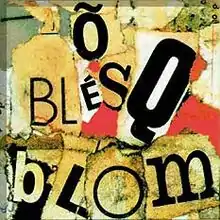Õ Blésq Blom
Õ Blésq Blom is the fifth studio album released by Brazilian rock band Titãs. The name of the album means "The first men who walked on the Earth" in the language created by Mauro and Quitéria, two repentistas from the state of Pernambuco.[2] The language is a mixture of Portuguese, English, Italian and Greek. Mauro and Quitéria are married and they met Titãs in a beach in Pernambuco.[3] They also composed and performed the opening and ending tracks for this album.
| Õ Blésq Blom | ||||
|---|---|---|---|---|
 | ||||
| Studio album by | ||||
| Released | October 16, 1989 | |||
| Recorded | July 1989 - September 1989 | |||
| Genre | Alternative rock, funk rock, world music | |||
| Length | 34:50 | |||
| Label | WEA | |||
| Producer | Liminha | |||
| Titãs chronology | ||||
| ||||
| Singles from Õ Blésq Blom | ||||
| ||||
| Review scores | |
|---|---|
| Source | Rating |
| Allmusic | |
It was elected in 2007 by Rolling Stone Brasil as the 74th best Brazilian music album of all time.[4] In an article published the year before in the same magazine, vocalist and keyboardist Sérgio Britto said he considered this album to be one of the best by the band, along with its predecessors Cabeça Dinossauro and Jesus não Tem Dentes no País dos Banguelas. He also said the work, "if it did not influence, at least it anticipated all that Mangue Beat wave and the mixture of MPB and nordestina music with elements of rock and electronic programming."[5]
Then vocalist Paulo Miklos, in a 2012 interview to the same magazine, added: "In front of our stage, debuting in Recife, there were everybody which would be from the manguebeat, in the front row. [Fred] Zeroquatro [from Mundo Livre S/A] and the whole gang. This was said to me by Chico Science. As such, that moment in which we took Mauro and Quitéria at the beach and recorded that album was a laboratory moment to make that aesthetic clash which generates something, pop rock mixed with nordestina music, with a dose of violent brasilianity and stuff."[6]
Track listing
| No. | Title | Writer(s) | Lead vocals | Length |
|---|---|---|---|---|
| 1. | "Introdução por Mauro e Quitéria" (Introduction by Mauro and Quitéria) | Mauro e Quitéria | Mauro and Quitéria | 0:44 |
| 2. | "Miséria" (Poverty) | Arnaldo Antunes, Paulo Miklos, Sérgio Britto | Britto and Miklos | 4:27 |
| 3. | "Racio Símio" (A word play with "Raciocínio" (reasoning) and "Símio" (simian)) | Antunes, Marcelo Fromer, Nando Reis | Reis | 3:19 |
| 4. | "O Camelo e o Dromedário" (The Camel and the Dromedary) | Fromer, Reis, Miklos, Tony Bellotto | Miklos | 5:22 |
| 5. | "Palavras" (Words) | Fromer, Britto | Britto | 2:33 |
| 6. | "Medo" (Fear) | Antunes, Fromer, Bellotto | Antunes | 2:06 |
| 7. | "Natureza Morta" (Lit. "Dead Nature", though the term also refers to still life)) | Antunes, Liminha, Branco Mello, Fromer, Miklos, Britto | Antunes and Mello | 0:19 |
| 8. | "Flores" (Flowers) | Charles Gavin, Miklos, Britto, Bellotto | Mello | 3:27 |
| 9. | "O Pulso" (The Pulse) | Antunes, Fromer, Bellotto | Antunes | 2:45 |
| 10. | "32 Dentes" (32 Teeth) | Mello, Fromer, Britto | Mello | 2:30 |
| 11. | "Faculdade" (Faculty or College) | Antunes, Mello, Fromer, Reis, Miklos | Reis | 3:13 |
| 12. | "Deus e o Diabo" (God and the Devil) | Reis, Miklos, Britto | Britto and Miklos | 3:28 |
| 13. | "Vinheta Final por Mauro e Quitéria" (Closing Fragment by Mauro and Quitéria) | Mauro e Quitéria | Mauro and Quitéria | 0:35 |
Personnel
- Tony Bellotto - Electric guitar, Acoustic guitar on "Flores", 12 string acoustic guitar on "32 Dentes"
- Arnaldo Antunes - lead vocals on "Medo" and "O Pulso", co-lead vocals on "Natureza Morta", backing vocals on "Miséria", "Raciosimio", "O Camelo e o Dromedário", "Flores", "32 Dentes", "Faculdade" and "Deus e o Diabo"
- Charles Gavin - drums
- Marcelo Fromer - Electric guitar, acoustic guitar on "32 Dentes" and "Medo"
- Nando Reis - Bass, lead vocals in "Raciosimio" and "Faculdade"
- Branco Mello - lead vocals on "Flores" and "32 Dentes", co-lead vocals "Natureza Morta", backing vocals on "Miséria", "Raciosimio", "O Camelo e o Dromedário", "Medo", "O Pulso", "Faculdade" and "Deus e o Diabo"
- Paulo Miklos - lead vocals in "O Camelo e o Dromedário", co-lead vocals "Miséria" and "Deus e o Diabo", Saxophone on "Flores", backing vocals on "Raciosimio", "Medo", "Flores", "O Pulso", "32 Dentes" and "Faculdade"
- Sérgio Britto - Keyboards, lead vocals in "Palavras", co-lead vocals "Miséria" and "Deus e o Diabo", keyboard programming on "Miséria" and "Deus e o Diabo", additional backing vocals on "Flores"
Additional personnel
- Liminha - Electronic drums in "Miséria", "Deus e o Diabo" and "Faculdade", electric guitar in "O Pulso" and "Deus e o Diabo", electronic percussion in "O Camelo e o Dromedário", keyboard programming in "O Pulso", "Miséria" and "Deus e o Diabo"
References
- Allmusic review
- Hangarnet - Forum - Discos que moldaram meu caráter
- Titãs history at their official website
- "Os 100 maiores discos da música brasileira" (in Portuguese). Umas Linhas. 2007-12-20. Retrieved 2009-04-20.
- Britto, Sérgio (November 2006). "Cabeça Dinossauro". Rolling Stone Brasil (in Portuguese). Grupo Spring de Comunicação.
- Santo, José Julio do Espírito (October 2012). "A Festa Parece uma Vida". Rolling Stone Brasil (73). Retrieved 24 December 2017.
